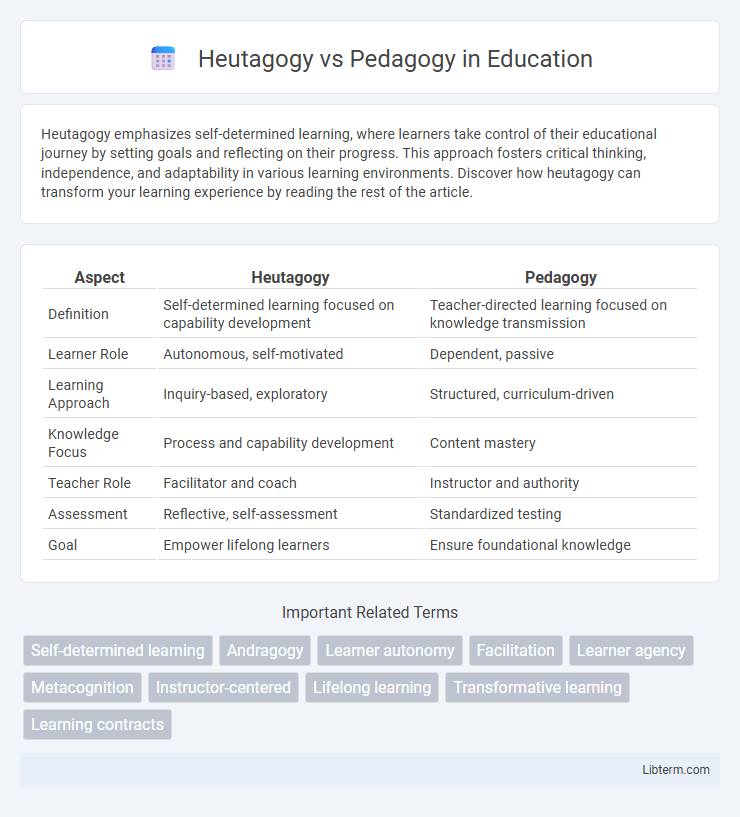Heutagogy emphasizes self-determined learning, where learners take control of their educational journey by setting goals and reflecting on their progress. This approach fosters critical thinking, independence, and adaptability in various learning environments. Discover how heutagogy can transform your learning experience by reading the rest of the article.
Table of Comparison
| Aspect | Heutagogy | Pedagogy |
|---|---|---|
| Definition | Self-determined learning focused on capability development | Teacher-directed learning focused on knowledge transmission |
| Learner Role | Autonomous, self-motivated | Dependent, passive |
| Learning Approach | Inquiry-based, exploratory | Structured, curriculum-driven |
| Knowledge Focus | Process and capability development | Content mastery |
| Teacher Role | Facilitator and coach | Instructor and authority |
| Assessment | Reflective, self-assessment | Standardized testing |
| Goal | Empower lifelong learners | Ensure foundational knowledge |
Introduction to Heutagogy and Pedagogy
Heutagogy emphasizes self-determined learning where learners take control of their educational process, fostering skills like critical thinking and problem-solving. Pedagogy traditionally centers on teacher-directed instruction, with educators guiding and structuring the learning experience for students. Understanding the contrast between heutagogy's learner autonomy and pedagogy's instructor-led framework is crucial for designing effective educational strategies.
Defining Pedagogy: Teacher-Centered Approaches
Pedagogy centers on teacher-directed instruction, where educators design, guide, and evaluate the learning process to ensure mastery of specific skills and knowledge. This traditional approach emphasizes structured lessons, curriculum adherence, and authoritative assessment methods. It contrasts with heutagogy by prioritizing the teacher's role in controlling educational content and pacing rather than learner autonomy.
Understanding Heutagogy: Learner-Centered Approaches
Heutagogy emphasizes learner-centered approaches by fostering self-determined learning, where individuals take control of their educational journey through reflection and critical thinking. Unlike traditional pedagogy, which relies on teacher-led instruction, heutagogy promotes autonomy and capability development, enabling learners to adapt knowledge in diverse contexts. This approach integrates metacognitive skills and continuous learning, making it essential in modern education for lifelong skill acquisition and personal growth.
Key Differences: Heutagogy vs Pedagogy
Heutagogy emphasizes learner autonomy and self-determined learning, where individuals direct their own educational journeys, contrasting with pedagogy's teacher-centered approach focusing on structured instruction and curriculum delivery. In heutagogy, the learner's capacity to acquire and apply skills independently is prioritized, fostering adaptability and lifelong learning, while pedagogy typically involves guided learning with predetermined outcomes. The key differences lie in the role of the educator, learner control, and the emphasis on developing learner capability versus competence.
Learning Autonomy in Heutagogy
Heutagogy emphasizes learning autonomy by encouraging learners to take full control over their educational journey, fostering self-determined learning strategies and metacognitive skills. Unlike pedagogy, which relies on instructor-led guidance and structured curricula, heutagogy promotes adaptive learning environments where learners define their goals and processes. This shift enhances critical thinking, problem-solving abilities, and lifelong learning competencies essential in dynamic knowledge economies.
Role of Educators: Facilitator vs Instructor
In heutagogy, educators act as facilitators who guide learners to take control of their own educational journey through self-directed exploration and critical thinking. In pedagogy, instructors primarily deliver structured content and direct learning activities, focusing on knowledge transmission and skill acquisition. This shift from instructor-led teaching to facilitator-driven learning promotes autonomy, adaptability, and lifelong learning skills crucial in heutagogical environments.
Curriculum Design: Structured vs Flexible Learning
Heutagogy emphasizes flexible, learner-centered curriculum design that adapts to individual needs and promotes self-directed learning, while pedagogy relies on a structured, teacher-directed curriculum with predetermined objectives and sequential content delivery. In heutagogical approaches, learners have autonomy to explore topics deeply and at their own pace, fostering critical thinking and problem-solving skills. Pedagogical models prioritize standardized content that ensures consistent knowledge acquisition but may limit personalization and learner agency.
Application in Modern Education Systems
Heutagogy emphasizes self-determined learning, empowering students to take control of their educational journey through reflective practice and critical thinking, which aligns with modern education's focus on lifelong learning and adaptability. Pedagogy traditionally centers on teacher-directed instruction, suitable for foundational knowledge acquisition but often less flexible to individual learner needs in rapidly changing environments. Modern education systems increasingly integrate heutagogic strategies to foster autonomy and personalized learning, complementing pedagogical methods for a balanced, student-centered approach.
Benefits and Challenges of Heutagogy and Pedagogy
Heutagogy emphasizes learner autonomy and self-determined learning, fostering critical thinking and adaptability, while pedagogy relies on instructor-led guidance, promoting structured knowledge acquisition and foundational skill development. Benefits of heutagogy include enhanced learner engagement and personalized learning pathways, but it poses challenges such as requiring high learner motivation and digital literacy. Pedagogy offers clear objectives and easier assessment but may limit creativity and reduce learner independence, leading to passive knowledge absorption.
Future Trends in Learning: Evolving Educational Paradigms
Heutagogy emphasizes learner autonomy and self-determined learning, shaping future educational trends by fostering critical thinking and adaptability in rapidly changing environments. Pedagogy, traditionally centered on teacher-led instruction, is evolving to integrate more learner-centered approaches, blending structured guidance with personalized exploration. Emerging technologies and digital platforms accelerate the shift towards heutagogical models, promoting lifelong learning and skill acquisition essential for future workforce demands.
Heutagogy Infographic

 libterm.com
libterm.com